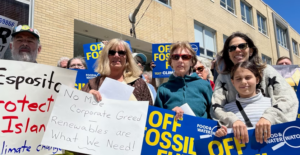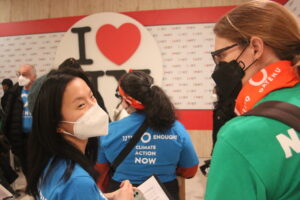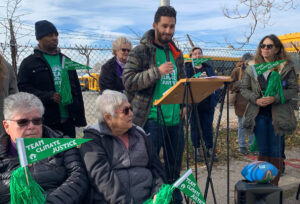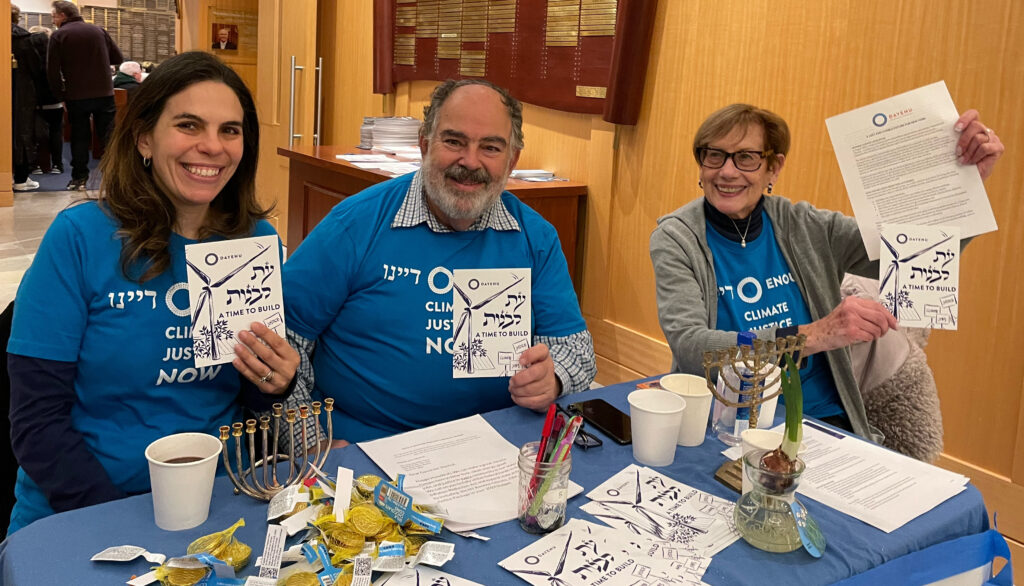DAYENU CLIMATE ACTIVISTS IN ACTION
One of Dayenu’s most dedicated activists, Lauren Krueger has been especially busy during the recent New York legislative session. She’s made the trip from her home on Long Island to the State House in Albany three times so far this year, participating in the campaign to pass the “Climate, Jobs, and Justice” legislative package.
Lauren is also on the board of her local synagogue, the Merrick Jewish Center, where she has spearheaded several climate actions.
Interview has been shortened for length and clarity.
Dayenu: How did you come to be active with Dayenu?
A few years ago, our new rabbi was asking everybody “What do you think the synagogue needs?” I said we need a sustainability committee – so I started one. The idea was to look inward, to see what we could do in the building as far as changing our practices in a more sustainable manner. For example, we started a garden.
From there, I’ve been trying to figure out what that means for advocacy, education, and outreach. And that’s how I found Dayenu.
We recognized that we could do a lot as a synagogue, but we could do more if we were doing activism – if we were going out and asking for better policies and speaking with our legislators and things like that.
The Dayenu circle is sort of the activism branch of our sustainability committee; it’s us and people at three or four other synagogues in the area.
Dayenu: Were you doing climate activism before you brought this up at the synagogue?
I was not. I was forming this idea in my head more and more as the political situation got worse in this country. And it reached a boiling point, and I realized that through the synagogue, I had a way to create change that was bigger than what I could do on my own.
I’ve been a stay-at-home parent for 12 years, and this has become sort of this glorious purpose that I can finally attach myself to and put a lot of work into and hopefully create a greater thing.
Dayenu: How does your role as a parent play into your feelings about climate activism?
It informs things very much. I want to have a world where my kids will be as comfortable as I was. I want them to have the opportunities – to be able to go to the beach, to play outside, to have clean water, to be able to breathe the air. Basically, not live in a hellscape.

Dayenu: You note two prongs of the work. One is inward, and one is outward. Are people willing to work on the big system actions?
I always broadcast opportunities to the sustainability group about what the Dayenu Circle is doing – but I don’t usually get much response. However, when we did postcarding at our synagogue, we got a huge level of participation, which was amazing! [Dayenu activists participated in efforts to send thousands of postcards to state policymakers as part of the campaign A Time To Build.]
I’m not sure that any of those people would have done it on their own, but I’m glad that they did it since we were there. It speaks to how impactful that is, when you’re getting people to engage who wouldn’t otherwise.
Dayenu: Let’s talk about the New York legislative session. You’re participating in activities with New York Renews. Did you get engaged with them through Dayenu and the Jewish Climate Action Network (JCAN)?
When I was looking to see what groups were doing climate work, I found several that sounded interesting – and I sort of joined up with all of them. I’ve been gradually eliminating those that don’t really speak my language.
I was very excited when I saw Noa [Gordon-Guterman, Dayenu’s New York organizer] was on the same New York Renews call.
Dayenu: What would you say about their work that inspires you?
Their commitment to social justice and environmental justice is really important. They have a good purpose, as well as a good process. They’re very good at trying to involve people to do the most that they can do, and being as equal as possible. I was very impressed at the State House by how many different people participated, how many different voices were being raised up.

Dayenu: How many times have you been to the State House this year?
Three times. We had appointments set up with legislators’ offices in advance, and it was energizing. It was really cool to meet people who I had only seen online before.
It’s so empowering to meet with people who are doing this work. And it definitely gives me more strength to connect with everybody I meet at these things.
Dayenu: How does it feel to engage in climate activism as a Jew? What about your faith makes you feel compelled to take action?
That’s a tough question. I came to climate activism through my involvement at the synagogue, because it was a way to engage with both. My personal relationship with Judaism makes me this person who needs to be doing this work.
I don’t know what’s cause and what’s effect, but it just seems clear to me that these are aspects of being Jewish. Taking care of the planet is part of what we do. I don’t think you can separate from the religion as a whole.
I am into this particular tenet of Judaism – that’s how it’s real for me. The stewardship, the leave things in a better place than you found them, the responsibility to have a place for your generations to come. Plant trees now to let generations of the future enjoy – it’s all very important.

Dayenu: So once the New York session is over, do you have plans for your next activities?
Two things are coming up. First, it’s really important that the Long Island Power Authority (LIPA) become a fully public utility. I spoke at a rally outside Senator Kevin Thomas’s office in Garden City about this issue; he’s done all the hard work already — now he just needs to introduce and champion it.
Second, I’m really interested right now in promoting our area getting electric school buses. I’m mobilizing our Dayenu Circle, as well as all the parents and all the kids I can muster, to get the word out that we actually do want these buses. Bus drivers want them and kids want them and parents want them – give us the buses!
They’re expensive, but there’s a lot of money in the Inflation Reduction Act and in the New York budget there’s money set aside for electric school buses. I don’t know how much a diesel bus costs, but I do know that maintaining an electric vehicle is much less expensive than maintaining a diesel vehicle. There are a lot fewer moving parts, the health costs are certainly lower, and the environmental costs are much lower. Saying they’re too expensive is a calculation that they’re not making on purpose.
Dayenu: Anything else you want to add?
I just want to say that all the people I’ve met have been so wonderful. I love working with Noa. I love the enthusiasm, the stick-to-it-iveness. The inventiveness.
I love this movement and I’m so happy to be a part of it.

